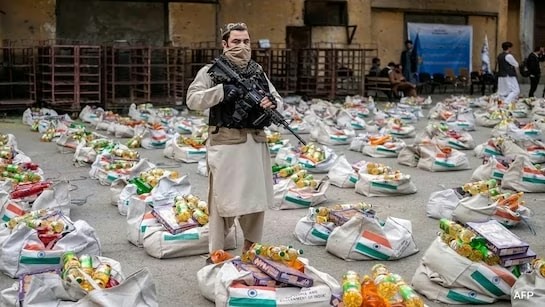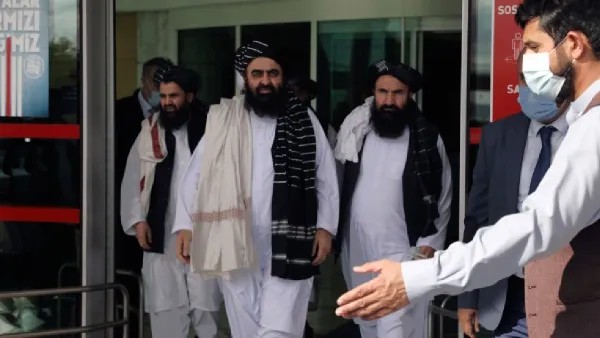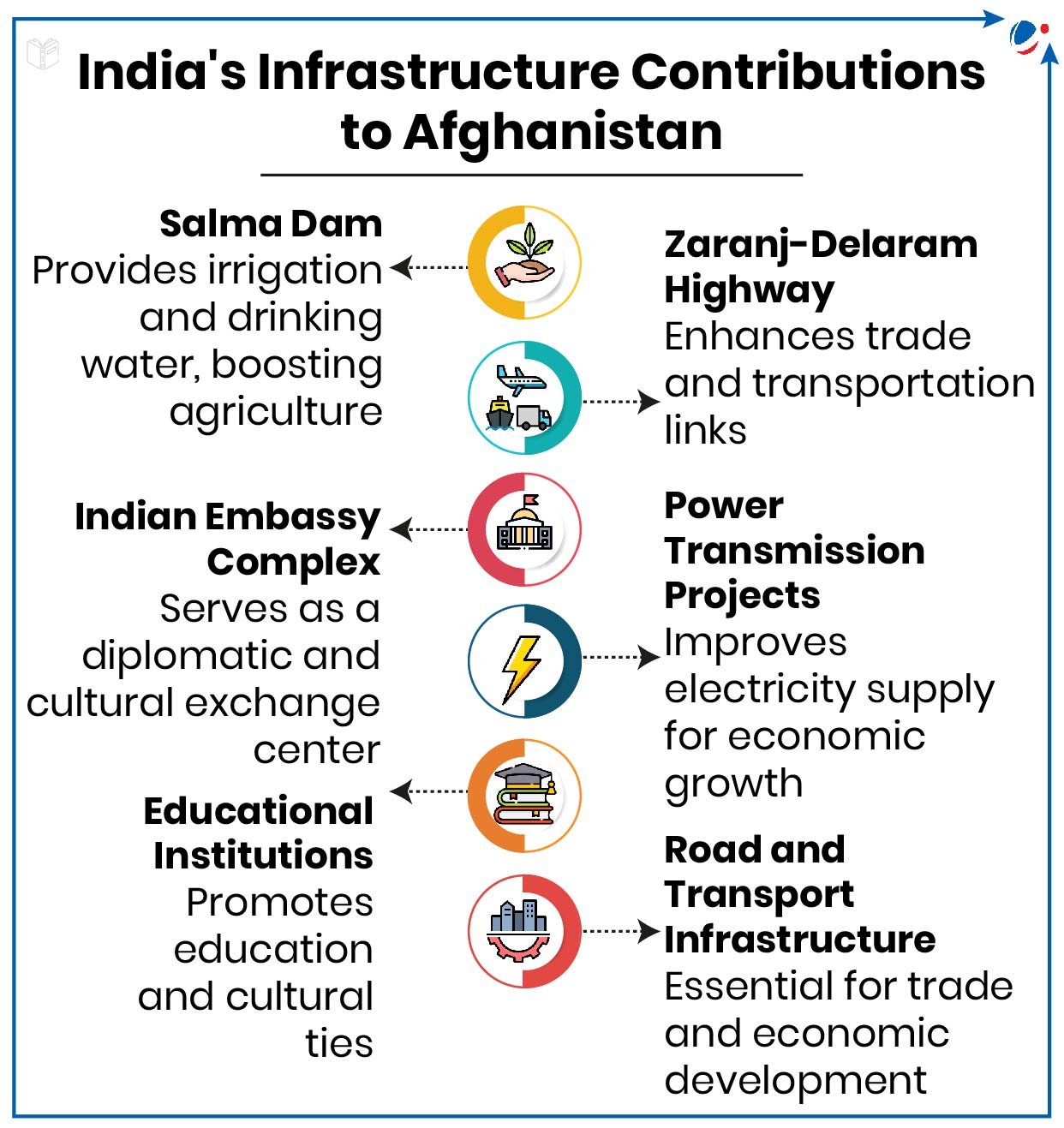Taliban’s Foreign Minister To Visit India In Historic Diplomatic Breakthrough
This will be the first high-level visit from Kabul to New Delhi since the Taliban seized power in Afghanistan in August 2021, marking a new chapter in India-Taliban engagement.

In a landmark development that could reshape regional geopolitics, Afghan Foreign Minister Amir Khan Muttaqi of the Taliban government is all set to visit India on October 9. This will be the first high-level visit from Kabul to New Delhi since the Taliban seized power in Afghanistan in August 2021, marking a new chapter in India-Taliban engagement.
The United Nations Security Council has confirmed that Muttaqi has been granted a temporary exemption from international travel restrictions, allowing him to visit New Delhi between October 9 and 16. The exemption underlines the significance attached to the visit, both by the Taliban administration and by regional powers seeking to recalibrate ties.
Indian diplomatic circles have been preparing for this moment for months. Since January, Indian officials, including Foreign Secretary Vikram Misri and senior IFS officer J.P. Singh, have held multiple rounds of dialogue with Muttaqi and other Taliban leaders, often meeting in neutral venues like Dubai. India’s Foreign Secretary Vikram Misri met Afghan Foreign Minister Amir Khan Muttaqi in Dubai, where discussions centred on New Delhi’s ongoing humanitarian assistance to Afghanistan, particularly in strengthening the health sector and supporting refugee rehabilitation.
The turning point came on May 15 immediately after India’s successful Operation Sindoor against Pakistan, when External Affairs Minister S. Jaishankar held a phone conversation with Muttaqi – the first ministerial-level contact since 2021. During that discussion, Jaishankar expressed appreciation for the Taliban’s condemnation of the Pahalgam terror attack and reaffirmed India’s “traditional friendship with the Afghan people”.
Earlier in April, the Taliban had condemned the Pahalgam terror attack in India’s Kashmir during a high-level meeting with Indian officials in Kabul, where India shared specific details of the terror attack. This significant statement indicated how India and Afghanistan were on the same page on Pakistan-sponsored terrorism in the region.
India has since expanded direct humanitarian aid to Afghanistan, providing food grains, medical supplies, and development assistance. Sources say the Taliban administration has also formally conveyed several requirements to India, ranging from energy support to infrastructure cooperation.
Following the devastating earthquake in September, India emerged as one of the first responders, swiftly dispatching 1,000 family tents and 15 tonnes of food supplies to the worst-affected provinces. This was soon followed by an additional 21 tonnes of relief material, including essential medicines, hygiene kits, blankets, and generators, underscoring India’s commitment to aiding the Afghan people in times of crisis.
Since the Taliban’s takeover in August 2021, India has supplied Afghanistan with nearly 50,000 tonnes of wheat, more than 330 tonnes of medicines and vaccines, and 40,000 litres of pesticides, along with a range of other essential items. These sustained efforts have provided critical help to millions of Afghans grappling with food insecurity, health challenges, and humanitarian distress.
The visit is being widely interpreted as a setback for Pakistan, which has long sought to maintain influence over Kabul. Islamabad’s decision earlier this year to repatriate more than 80,000 Afghan refugees strained ties with the Taliban, opening diplomatic space for India to step in more assertively. Analysts note that Muttaqi’s presence in New Delhi signals Kabul’s willingness to diversify its foreign relations and reduce dependency on Pakistan.
For India, the visit is a delicate but strategic gamble. Engaging directly with the Taliban government allows New Delhi to secure its long-term interests in Afghanistan, prevent terror threats emanating from the region, and counterbalance Chinese and Pakistani influence.
The October 10 bilateral meeting during Afghan Foreign Minister Muttaqi’s visit could mark a turning point, setting India and Afghanistan on a new trajectory of cautious cooperation – one that could redraw power equations across South Asia.
Featured Video Of The Day

The Foreign Minister of Afghanistan’s Taliban administration, Amir Khan Muttaqi, is scheduled to visit India from October 9 to 16, 2025, marking the first high-level visit from the group since it seized power in 2021. The trip was made possible after the UN Security Council granted Muttaqi a temporary waiver from international travel restrictions.
The UN Security Council (UNSC) on Thursday approved Afghan Taliban Foreign Minister Amir Khan Muttaqi’s visit to India, after New Delhi requested clearance, sources told News18.
Muttaqi’s Visit Schedule Muttaqi is set to arrive in New Delhi from October 9 to 16, following a visit to Russia on October 6. The UNSC confirmed this important development after previously denying permission for the trip.

As Muttaqi is under sanctions pursuant to UNSC Resolution 1988, which targets Taliban leaders, he requires prior approval from the Security Council Committee for international travel. On September 30, the committee granted an exemption to the travel ban, allowing him to visit India during the specified dates. Strategic Significance Sources said the visit holds considerable significance for India-Taliban ties, with Muttaqi scheduled for high-level meetings in New Delhi. Analysts view this as a strategic move by India to counter Pakistan and China’s influence in the region.
Background on Muttaqi Amir Khan Muttaqi has served as Afghanistan’s foreign minister since the Taliban takeover of Kabul in August 2021. In May 2025, he held informal talks in Beijing with his Chinese and Pakistani counterparts, Wang Yi and Ishaq Dar, to enhance trilateral cooperation, including discussions on expanding the China-Pakistan Economic Corridor (CPEC) to Afghanistan.
India has historically opposed the USD 60 billion CPEC project, citing that it passes through Pakistan-occupied Kashmir (PoK).
Significance of the visit
This visit is a major diplomatic development and part of India’s evolving pragmatic engagement with the Taliban.
projects across Afghanistan.[xxv] At that point, however, there was no indication that New Delhi was willing to extend its engagement beyond humanitarian assistance. It was only after the January 2025 meeting that the first clear sign emerged of India’s willingness to potentially revive development cooperation alongside its ongoing humanitarian support in the near future.[xxvi] The Taliban made its first diplomatic appointment in India in November 2024 when the regime announced Dr Ikramuddin Kamil, an alumnus of New Delhi’s South Asian University, as the “Acting Consul” in Mumbai.[xxvii]
India’s Cautious Approach towards the Taliban
The first Ministerial engagement between India and the Taliban may not herald a full-fledged diplomatic embrace, but it is a clear signal that India is adapting to the new realities of the region. This engagement signals a deepening relationship between New Delhi and Kabul, marking what seems to be a logical progression in India’s careful and calibrated approach to the Taliban’s rule since 2021. By acknowledging the Taliban regime as a reality, India appears to recognise that strategic detachment towards the Taliban may no longer align with its national interests or the broader objectives of India-Afghanistan relations.
At the same time, it is important to remember that while strategic interests drive India’s engagement with the Taliban, ethical dilemmas persist. The Taliban’s human rights record, particularly concerning women’s rights, minority protections and the lack of an inclusive administration, remain points of concern for India. New Delhi has to navigate these issues carefully, balancing realpolitik with its democratic values and international commitments. Engaging with the Taliban without formal recognition allows India to maintain this delicate balance.
Conclusion
In conclusion, the Ministerial-level telephonic meeting between India and the Taliban on 15 May 2025 marks a subtle yet significant shift in India’s foreign policy toward Afghanistan. It underscores a pragmatic approach aimed at protecting national interests, fostering regional stability and extending support to the Afghan people. While the road ahead is fraught with uncertainties, India’s calibrated engagement with the Taliban demonstrates that diplomacy, even with adversarial actors, remains a crucial tool for securing peace, stability and strategic leverage in a volatile region. As the situation in Afghanistan continues to evolve, India’s engagement strategy will require continuous assessment to align with its strategic objectives and ethical standards.
For India, the visit is a strategic move aimed at:
- Balancing regional influence: It provides a way to counter China’s growing footprint in Afghanistan and reduce Afghanistan’s dependency on Pakistan.
- Securing national interests: Direct engagement allows India to protect its long-term investments in Afghanistan and address security concerns, including preventing terror threats from Afghan soil.
- Deepening trade and humanitarian ties: The visit is expected to focus on development assistance and exploring ways to boost trade using Iran’s Chabahar Port.
Protecting investments: India has invested billions in over 500 projects in Afghanistan and seeks to ensure the security of its assets.
Why in the news?

Recently, 1st bilateral meeting between India’s foreign secretary and Afghanistan’s acting foreign minister took place in Dubai.
More on the news
- The meet marks India’s diplomatic shift and growing engagement with Taliban-backed Afghan government.
- This was the highest level of engagement with Taliban since the latter’s takeover of Kabul in 2021 post US withdrawal.
- Earlier in November, 2024, 1st official meeting between Indian diplomats and Taliban’s defence minister took place in Kabul.
Why shift in India’s diplomatic policy?
- Deteriorating Afghan–Pakistan relations: The recently strained relationship between the two countries provides an opportunity for India to isolate Pakistan from the region.
- E.g., Pakistan has expelled more than 5,00,000 refugees, creating a humanitarian crisis in Afghanistan;

- Pakistani airstrike on eastern Afghanistan to neutralize Tehrik-e-Taliban Pakistan (TTP) camps, has been alleged as a direct violation to Afghan’s sovereignty.
- To counter rising Chinese influence: Since Taliban’s return, China has been taking aggressively proactive steps in normalizing its ties with Afghanistan.
- E.g., China’s appointment of new ambassador, signing minerals and other mining contracts, taking up urban development projects in Kabul etc.
- To prevent Afghan-soil based terrorism: Afghanistan has been used as launchpad by terror groups; constructive engagement ensures that Taliban would not allow Afghan territory to be used against India.
- E.g., Since the US withdrawal, India has been cognizant of covert or overt threat from Pakistan-backed terrorist groups operating in Afghanistan, such as Lashkar-e-Tayyaba (LeT), Jaish-e-Mohammad (JeM) etc.
- To strengthen connectivity and access to Central Asia: Afghanistan’s strategic location at ‘Heart of Asia’ – crossroads of Central and South Asia – is significant, as it has served as a route to India since the ancient times through the selected passage of Khyber and Bolan.
- E.g., Collaborating with Iran on Chabahar port development will improve access to Central Asia via Afghanistan.
- To restart developmental projects and secure already done investments: E.g., India has invested more than $ 3 billion in over 500 projects across Afghanistan, including roads, power lines, dams, hospitals etc.
- India has also trained Afghan officers, awarded thousands of scholarships to students and built a new parliament building in Afghanistan.
- To strengthen India’s soft power: In the form of humanitarian assistance like providing wheat supplies to drought-affected Afghanistan in late 2021.
- E.g., in the Union Budget for 2024-25, India allocated Rs 50 crore for assistance to Afghanistan.
- To ensure stability in the region: India is concerned about the potential for instability in Afghanistan spilling over into the region.
Why the shift in diplomatic approach can be challenging?
- Taliban’s internal dynamics: Taliban being a violent and brutal actor has done little to reform itself from what it was in the 1990s, especially in its treatment towards women and girls.
- E.g., Since its return to power, Taliban has failed to form a functioning inclusive government to provide the Afghan people with basic economic opportunities, health facilities, educational options etc.
- Terrorism and security concerns: Taliban is known to back global and regional terror outfits in their courtyard, which poses a direct security threat to India.
- E.g., Presence of terror groups such as Islamic State of Khorasan (ISKP), Al-Qaeda, Pakistan-backed LeT, JeM etc. have made the region more vulnerable to radicalism, and extremism.
- Drug trafficking: Afghanistan is the leading producer of opium globally, and the drug trade has fueled instability and violence in the region, impacting both Afghanistan and India.
- E.g., in 2021, over 80% of world’s opium originated from Afghanistan, and India fears that the earning could be used for terror financing.
- Increasing presence of China: China’s rising involvement in Afghanistan after Taliban’s takeover has raised concerns in India over Beijing’s expanding influence and engagements in the region.
- E.g., China is keen on expanding China-Pakistan Economic Corridor (CPEC) to Afghanistan.
Way forward
- Act West Policy: India should be realism in acting west, and should capitalize its traditional friendship and engage Afghanistan more prominently in its ‘Act West Policy’.
- Humanitarian assistance: Keeping in mind the complex geopolitical chessboard and to counter China, India should enhance its humanitarian assistance for Afghan’s health sector and for rehabilitation of refugees.
- Resuming developmental projects: Increasing investments through developmental projects would improve the Afghan economy, create jobs, curb drug trafficking, reduce terrorism and would also deepen India’s economic engagement with Afghanistan.
- Cultural engagements: Develop people-to-people ties through liberalizing the visa regime for Afghan people, sports (cricket) infrastructure support, educational scholarships etc.
- Enhanced diplomatic engagements: At various international and multi-lateral forums such as South Asian Association for Regional Cooperation (SAARC) etc.
For the Taliban, the visit offers:
In a move that could reshape regional diplomacy, Afghanistan’s acting Foreign Minister Amir Khan Mutaqi is set to visit New Delhi next week. This will be the first public visit of a Taliban leader to India since the group seized power in Kabul in August 2021. The UN Security Council’s 1988 Sanctions Committee approved a travel-ban exemption on 30 September 2025, allowing Mutaqi to travel from October 9 to 16. His main engagements in the capital are expected on October 9 and 10.
UN Gives the Green Light
Mutaqi is on the UNSC sanctions list under Resolution 1988 (2011), which imposes travel bans, asset freezes, and arms restrictions on Taliban leaders. To facilitate the India visit, the Council approved a special exemption — a rare diplomatic nod signalling the global importance of this engagement.
From Distance to Direct Contact
For decades, India has kept the Taliban at arm’s length, wary of its historic ties with Pakistan’s security establishment and groups targeting Indian interests. After the Taliban’s return in 2021, New Delhi stopped short of recognising the regime but kept humanitarian channels open.
By June 2022, India reopened its embassy in Kabul with a limited technical team — a cautious step signalling functional engagement. Mutaqi’s Delhi trip now takes this outreach into the open, transforming quiet backchannel talks into a headline diplomatic moment.
What’s on India’s Mind?
Behind the optics, India has clear priorities:
• Terror Concerns: Ensuring Afghan territory is not used to stage or support attacks against India.
• Development Projects: Safeguarding over $3 billion worth of investments, including roads, dams, and the Afghan Parliament building.
• Regional Trade: Exploring links through Chabahar Port and land routes to Central Asia, where Afghanistan is a critical piece of the puzzle.
Taliban’s Pitch to India
For Mutaqi and the Taliban regime, Delhi represents more than a pitstop. India is a regional heavyweight with deep investments in Afghan development. Public engagement with New Delhi not only lends the Taliban a degree of diplomatic legitimacy but also signals its intent to broaden ties beyond traditional allies like China, Russia, Iran, and Pakistan.
Delhi’s Balancing Act
Officials underline that hosting Mutaqi does not mean recognition of the Taliban regime. Instead, it reflects a pragmatic shift: engaging the rulers of Kabul without endorsing them.
India has to walk a tightrope — talking to the Taliban for security and connectivity reasons, while staying mindful of concerns over women’s rights, governance, and terrorism links.
Why This Visit Matters
The optics are as important as the agenda. A Taliban foreign minister walking the corridors of New Delhi marks a diplomatic milestone and a test case for India’s new Afghan playbook.
For India, the visit is less about friendship and more about realpolitik — protecting national security and keeping a foot in Afghanistan’s future. For the Taliban, it is about breaking isolation and showcasing regional acceptance.
The Big Picture
Amir Khan Mutaqi’s upcoming trip to India will be remembered as a first — the first Taliban minister to visit Delhi openly since 2021. Whether it ushers in a new chapter or remains a one-off, the visit underscores one truth: India cannot ignore the Taliban, and the Taliban cannot afford to ignore India.